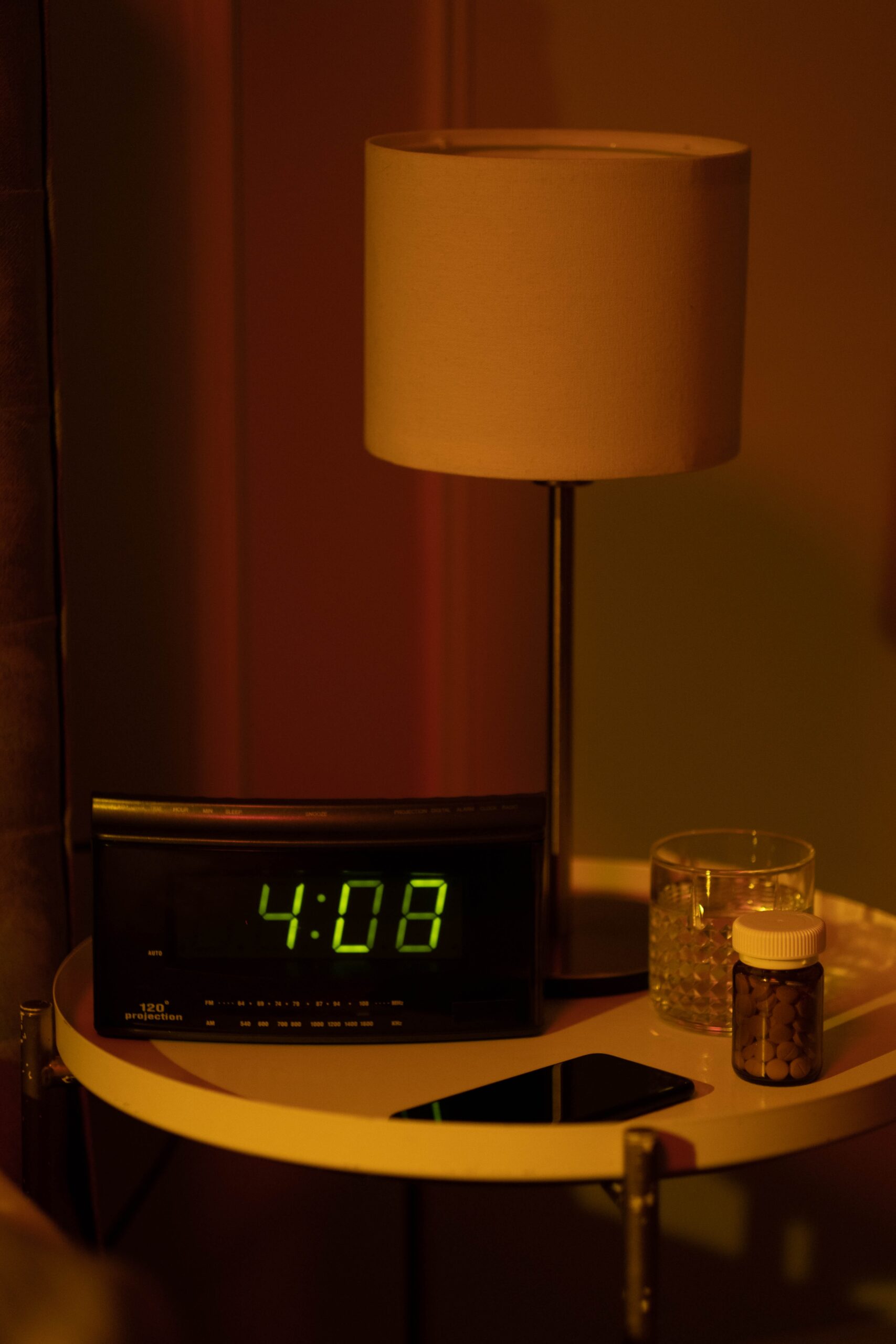How many times do you wake up in the middle of the night, only to lay in bed until the sun comes up or until your alarm starts to beep? What is worse is already knowing that once you wake up, you just seemingly know that you will not fall back asleep. For the life of you, falling back asleep seems impossible. You don’t know what went wrong because you got to bed on time and fell asleep right away, but somehow you still found a way to start the next day on sleep deprivation.
Have you ever wondered about the reasons behind waking up in the middle of the night? It is not just the excessive intake of water that can make you urinate frequently, but also physical ailments such as nasal congestion, cough, asthma, and sleep apnea that can cause unexpected awakenings. However, have you ever considered the possibility of mental health issues being the root cause? The answer is stress. Stress can cause you to wake up in the middle of the night and disrupt your sleep. So, it is important to take care of your mental health and manage your stress levels to ensure a peaceful and restful sleep.
Here is a list of the most common culprits of sleep interruption:
- Stress and anxiety
- Drinking too much water or eating too much food before bed
- Not drinking enough water or not eating enough food before bed
- Drinking too much alcohol or caffeine
- Overheating
- Sleeping with a poor quality mattress or pillow
- Not staying on a sleep schedule or routine
- Too much surrounding noise
- Medical illness
- Aging
Are you facing any of the issues mentioned above? If so, I have some great insights to share with you. In this blog post, I’ll be discussing each issue and offering solutions that have proven to be effective. Let’s start with my personal favorite – the first solution that can help you tackle these problems head-on. So, let’s dive right into it!
NOT SO EXPERT TIP:
Simply put. If or when you wake up, RESIST ALL TEMPTATION TO LOOK AT THE TIME. Don’t do it. The moment you look at the time, you already know you either will lay in bed for another hour or you may never fall back asleep. It’s like touching a hot pan even though you know it will burn you. So, why do it? Instead, try keeping your phone away from your bed, out of arm’s reach. Trust me, it works. By resisting the temptation to check the time, you’ll find yourself getting more and better quality sleep. Imagine waking up every morning feeling refreshed and energized, ready to take on the day. All it takes is a little bit of self-control. So, the next time you wake up in the middle of the night, resist the urge to check the time. You’ll be surprised at how quickly you’ll fall back asleep. Thank me later when you’re getting a full seven to eight hours of restful sleep every night.
Problem #1 Stress And Anxiety
Difficulty in sleeping due to anxiety is a common problem, but if you are frequently waking up in the middle of the night, it’s crucial to identify and resolve any underlying stress factors. Racing thoughts are one of the primary causes of nighttime awakenings. Address the root cause of your stress to enjoy a restful and peaceful sleep.
Solution:
Getting a good night’s sleep is crucial for our overall well-being. To ensure that we get the rest we need, it’s important to engage in pre-sleep activities that promote relaxation and calmness. Prayer, reflection, meditation, journal writing, and talking to loved ones are all great ways to unwind before bed. However, if you find yourself struggling with nighttime thoughts that keep you awake, there are a few things you can do to help. Keep your surroundings peaceful and quiet, drink a glass of water, put on some soothing background noise, and focus on your breathing. By taking these simple steps, you can help prevent anxiety and promote a restful night’s sleep.
I understand that your life circumstances are unique to you, and I want to help you find a solution that works for you. If you’re struggling with racing thoughts at night due to work-related anxiety, quitting your job may not be the best option. Instead, I suggest being cautious about relying alcohol, drugs, over-the-counter sleeping aids, or anti-anxiety medications like benzodiazepines. While these medications can be effective in alleviating anxiety, they can also be addictive and have long-term dependency concerns.
Problem #2 Drinking too much water or eating too much food before bed
Drinking too much water in the evening can cause nocturia, which is the need to get up in the middle of the night to urinate. This can disrupt your sleep and give an opportunity for your mind to wake up and start racing with anxious thoughts. And as we all know, there is no guarantee that we will fall back asleep once we’re awake. The longer we stay awake, the more time our restless mind and anxiety have to kick in and keep us up all night. So, it’s important to be mindful of how much water we drink before bedtime to ensure a good night’s sleep.
The food you eat can significantly impact the quality of your sleep. It’s true! The amount and type of food you consume, as well as the timing of your meals, can all play a role. If you eat a heavy meal before bed, you increase your risk of indigestion, which can lead to unwanted bowel patterns during the night. Don’t let poor food choices ruin your sleep – make sure to choose wisely and prioritize a good night’s rest.
Consuming too much sugar before bed can also induce restlessness and affect your sleep quality. Binge eating sugar causes a rapid spike in blood sugar levels, which is then followed by a steep drop. This drop causes the body to produce cortisol, a stress hormone that can keep you up at night. Your sleep quality relies on a delicate balance between hormones like melatonin (sleep hormone) and cortisol (stress hormone). By disrupting this balance with excess sugar, you’re putting your sleep at risk. Remember, a good night’s sleep is essential for your health and well-being. So, if you want to sleep well, it’s best to avoid sugary snacks before bedtime.
If you want to avoid discomfort, anxious feelings and a nighttime cough, make sure you don’t eat anything for at least an hour before going to bed. Eating too close to bedtime can increase the risk of heartburn, which can cause these symptoms and lead to frustration lying in bed for hours on end. So, if you want to ensure a good night’s sleep, it’s important to be mindful of what and when you eat
Solution:
It’s important to remember that the last few hours before bed can have a big impact on the quality of your sleep. To ensure a good night’s rest, try drinking one glass of water within the last 1-2 hours before bed, but no more than that. As for sugar, it’s best to avoid it altogether, or if you must consume it, make sure you have at least 3 hours between your last high sugar consumption and your bedtime. By following these simple tips, you’ll wake up feeling refreshed and energized every day.

Problem #3 Not drinking enough water or not eating enough food before bed
Feeling thirsty and hungry are actually brilliant ways for your brain to communicate that you need to act in order to prevent dehydration and starvation. Talk about pretty impressive survival mechanisms! By feeling thirsty, your body is telling you to wake up and seek water for replenishment. A consequence of not drinking enough water is dehydration. If you have been dehydrated in the past, you may have personally experienced a cramp in your toes or foot in the middle of the night. It’s painful, can be difficult to get rid of, and interrupts sleep. And if you have been lucky enough to avoid a painful cramp, you may have suffered from a headache that can make it difficult to knock out in the first place. So next time you feel thirsty or hungry, listen to your body and give it what it needs to stay healthy and pain-free.
Have you ever experienced dizziness or a sudden head rush when getting up too fast? It’s a common occurrence, especially in the middle of the night. The heart rate naturally increases when we switch from a lying or seated position to a standing position. However, dehydration can intensify this effect, leading to palpitations – a sensation of racing, pounding, or irregular heartbeat. The last thing you want is to feel these palpitations, freak yourself out, get more anxious, and stay up all night.
Solution:
Staying hydrated is crucial throughout the day. To ensure a good night’s sleep, I recommended having a glass of water within the last 1-2 hours before bedtime. If you’re engaging in intense physical activity, it’s important to replenish your electrolytes with a sugar-free drink. However, be cautious not to overdo it, as excessive potassium intake can lead to heart palpitations. Remember, moderation is key. To curb late-night hunger, enjoy a satisfying meal 3 hours before bedtime or have a light snack. Follow these tips for a restful and rejuvenating night’s sleep.

#4 Drinking too much alcohol or caffeine
Alcohol, while it may make you feel sleepy, can actually disrupt your sleep cycle. This is because alcohol can interfere with certain stages of REM sleep, which are crucial for dreaming and memory consolidation. Moreover, excessive alcohol consumption can lead to a condition called holiday heart, which causes those pesky and unnerving palpitations. Similarly, too much caffeine intake, whether from coffee or pre-workout supplements, can also trigger heart palpitations and disturb your sleep.
Alcohol can also aggravate or worsen sleep apnea, a sleep disorder which I will touch upon later in this post.
Solution:
Consider moderation and timing if you want to partake in alcohol consumption. Abstain all together if you are in doubt.
#5 Overheating
High temperatures and humidity can interrupt your sleep and cause nighttime awakenings. Our body temperatures naturally decrease as we prepare for sleep, so a warm room temperature can disrupt this process. Have you ever flipped your pillow over to find the cooler side during the hot summer months? Although there are exceptions, I doubt that there are many individuals who frequently flip a pillow over in the middle of the night in order to access the warmer side.
Solution:
Investing in quality bedding is key to getting a good night’s sleep. This includes attention to a comfortable mattress, bed sheet set, and pillowcase. After doing some research, I came across a great set of pillowcases on Amazon that I highly recommend. The WishSmile brand offers pillowcases made from 100% bamboo rayon, which has been a game-changer for my sleep quality. While my journey to better sleep has been a process, switching to this material in 2022 has been the best decision I’ve made. Don’t compromise on your sleep – consider upgrading your bedding with these pillowcases.
If you’re someone who showers in the evening, here’s a tip to help regulate your body temperature and improve your sleep. After your shower, switch to cool or cold water for at least a few minutes. While warm water can help you relax and prepare for sleep, it’s important to lower your body temperature to achieve a successful rest. If you find yourself still sweating after a hot shower in the summer, it’s a sign that your body temperature is still too high and could be disrupting your sleep. Try incorporating this tip into your routine and see if it makes a difference in the quality of your rest.
#6 Sleeping with poor quality mattress or pillow
It’s not just the sheets and pillowcases that matter when it comes to a good night’s sleep. Your mattress and pillows play a crucial role too. If you’re sleeping on a low-quality mattress that sinks in, you could be putting yourself at risk for acute or chronic pain in your neck, back, or elsewhere. Pain can disrupt your sleep and leave you feeling exhausted. Invest in a quality mattress and pillows to ensure a comfortable rest.
Solution:
In 2018, I suffered from months of chronic right shoulder and right-sided neck pain, likely an impinged nerve. After tossing and turning, waking up in pain, night after night, I decided to invest in a new mattress. It was a memory foam, firm mattress, that saved my life (sleep). Find a new mattress that works for you, regardless of the specifics of firmness. I look forward to sleeping in my bed every night, and can confidently say that the mattress will not be the reason I wake up suddenly at 4 am.
#7 Not staying on a sleep schedule or routine
Keep that circadian rhythm in check. Simple as that.
Solution:
Try to go to bed at the same time every night and try to wake up at the same time every morning. That’s all folks.
#8 Too much surrounding noise
I am not referring to the internal noise that goes on upstairs in your head. I am talking about the noise from your upstairs neighbor, the neighbor next door, or the obnoxiously loud neighbors from across the street? It’s not just an annoyance, it can be detrimental to your health. Noise can wake you up, but the real problem arises when it scares you to the point that your heart starts racing, making it impossible to sleep.
Solution:
If you’re having trouble sleeping due to ambient noise, a noise machine with calming sounds can help you relax. Additionally, noise-cancelling curtains for your windows or doorways can make a significant difference. To keep yourself cool and block out surrounding noise, try using a rotating fan. However, be careful not to position the fan too close to you during the night, as it can cause dry air, trigger allergies, coughing, or wheezing in an asthmatic. Soundproofing options are essentials to a better night’s sleep.
#9 Medical illness
If you have been experiencing a chronic nighttime cough, it could be due to GERD (acid reflux), asthma, or allergies. A common cold can also cause nasal congestion and cough, which can disturb your sleep and make it difficult to fall back asleep.
Additionally, sleep apnea can cause snoring and frequent awakenings at night, leading to daytime fatigue and an overall feeling of unwellness. This may happen when your breathing stops and starts during sleep, causing your brain to alert you that you stopped breathing. It’s important to pay attention to these symptoms and seek medical attention if they persist.
Solution:
Consult with your primary healthcare provider about over-the-counter medications, prescription medications, lifestyle modifications, or specialized treatment modalities than can help.
#10 Aging
Getting old is the one thing that is neither preventable from a lifestyle or medical standpoint. While is can be delayed a bit, aging will happen and a lot of it can’t be fixed. Our sleep cycles change as we get older. For example, the REM stage of sleep gets shorter as we age. The brain may tell us to wake at odd times of the night. This, along with an overactive prostate and bladder, can really cause a nightmare of a time falling back asleep. More than anything, the worry is falling and getting injured in the late or early hours of your sleep time.
Solution:
When the fountain of youth is found, we will revisit this!
Final thoughts
The issue of nighttime awakening is complex and requires a proactive approach. To start with, it’s important to identify the root cause of your sudden wake-ups from deep sleep. You can begin by eliminating factors you can control, such as sugar, caffeine, or excessive alcohol consumption. Although it takes time, analyzing your mattress, pillow, and bedroom setup can help you avoid lethargy caused by disrupted sleep, which can lead to unproductive behavior. Remember, we sleep to recharge our batteries. So, are you willing to put in the effort necessary for a good night’s sleep?

![Best Tips To Fall Asleep: How I Knock Out In Seconds To Minutes, Without Medication [2023]](https://danthemanguide.com/wp-content/uploads/2023/07/insom-768x512.jpg)
![Why Close Male Friendships Are Crucial: How To Build Lasting And Meaningful Connections [2024]](https://danthemanguide.com/wp-content/uploads/2023/08/pexels-helena-lopes-1049317-768x525.jpg)
![How To Lose Weight Fast: 5 Simple Steps To Getting Rid Of Belly Fat [2024]](https://danthemanguide.com/wp-content/uploads/2023/08/pexels-towfiqu-barbhuiya-9927899-768x512.jpg)
![How To Quit Porn: Top 10 Tips That Helped Me Stop For Good [2024]](https://danthemanguide.com/wp-content/uploads/2023/07/pexels-photo-4571822.jpeg)
![10 Reasons Why You Need To Stop Watching Pornography Right Now [2024]](https://danthemanguide.com/wp-content/uploads/2023/09/pexels-junior-teixeira-2047905-768x1152.jpg)
![5 Qualities Of A Good Man: How To Be A Great Male Friend And Amazing Partner [2024]](https://danthemanguide.com/wp-content/uploads/2023/09/pexels-andre-furtado-1417255-768x512.jpg)
![How To “Be A Man”: Behaviors That Will Make You More Attractive [2024]](https://danthemanguide.com/wp-content/uploads/2023/09/pexels-hazily-light-18122661-768x960.jpg)